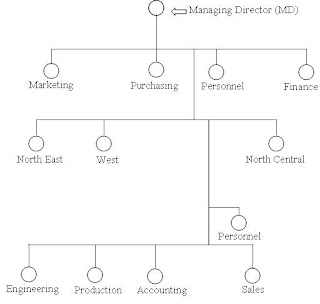Advantages of Geographic departmentation
- Profit making is placed at a lower level that is, the respective managers in the field are charged with the responsibility of making profit for the organization. This leaves the headquarters and the top level manager to have the time to plan for overall greater growth of the organization.
- Emphasis is placed on the local market. This is important because there is no point producing goods and services that are not readily sold to the customers. This is a problem which arises either because the goods do not meet the needs of the customers and/or the goods are not sold with the correct marketing strategies. But by operating close to the customers, their peculiar needs and problems are taking into consideration in producing and marketing the goods.
- Since the field managers and the staff are more or less experts in the local area, they can gather good results in terms of greater sales revenue compared to somebody who does not know the local environment. The field managers know the captains and other channel members through whom they can distribute the company's products. They also know the customs, norms and traditions and will not adopt strategies that will be offensive to the culture of the local people. All these and more a stranger can never appreciate let alone observe. The field officers also know their competitors and are better prepared to compete with them.
- The form of departmentation provides a fertile ground to train managers who can become general managers in future. This is because while in the field, he has got experiences in dealing with specialists in accounting, marketing/sales, personnel, production/engineering and was successful. The same experience can be brought to bear in his future role as a general manager without being unduly biased to any specialist.
Disadvantages of departmentation by geographic area
- There is high cost of coordination and control from the headquarters. In an attempt to ensure that the entire organization work as a team there is the need to link together the activities of one geographic area to the activities operating in another geographic area. This is not an easy task because it may necessitate staff transfers with the attendant costs. Visits also from the headquarters and other forms of communication may also demand enormous resources of the organization.
- The form of departmentation demands creating more levels of management. At each level, there are supporting staff. Beyond the payment of salaries and wages, workers must be provided with offices. And these offices must be furnished. Cars and other status symbols associated with each position must be made available. All these and more put demands on organizational resources.
See the diagram below
Fig. 6.2: Showing Geographic departmentation.
Again, this form of departmentation requires personnel with general managerial abilities who can not only be in the headquarters but more importantly in the field because as we have pointed out earlier the responsibility for profit is in the field.
But to find managers with general managerial ability that can take balanced and matured decisions is not easy. What one readily finds are specialists who cannot for reasons earlier given can be made general managers. If for any reason, specialist is made a general manager; such action can spell disaster to the organization.
SELF-ASSESSMENT EXERCISE 2
Reflect on the organizations operating in Nigeria. List at least five of them that operate geographic or territorial form of departmentation. Remember, that these organizations have branches all over Nigeria.
CONCLUSION
Two forms of departmentation have been discussed in this unit. These are the departmentation by enterprise functions and geographic/territorial form of departmentation. This means that an organization adopting any form of these departmentation have to group its activities along such lines.
But in doing so, it has to consider or weigh the cost/benefits. That is, it has to examine carefully the advantages as well as the disadvantages that are associated with the forms of departmentation. The outcome of such analysis will provide the basis for the choice of the form of departmentation to adopt



Social Plugin